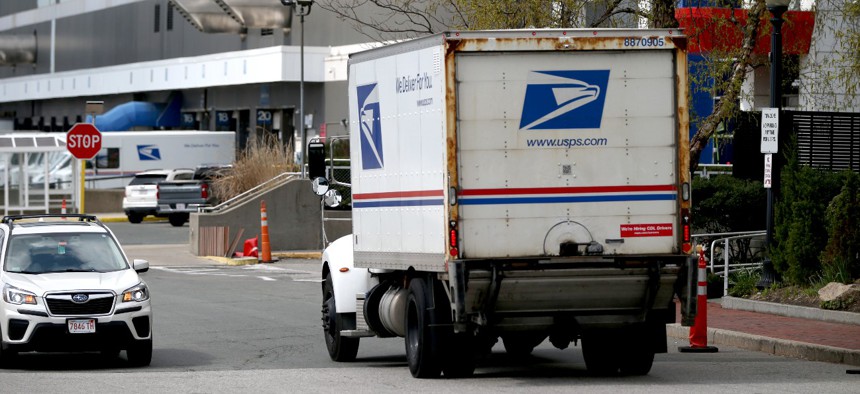
USPS maintains more than 1,700 contracted suppliers that primarily drive longer-haul “highway contract routes.” Jonathan Wiggs/The Boston Globe via Getty Images
USPS eyes expansion of a potentially major insourcing initiative
The program is in its infancy, but could lead to many thousands of jobs going from external contractors to internal agency employees.
The U.S. Postal Service has begun insourcing some of its trucking operations, opening the possibility of bringing back in house thousands of jobs that are currently contracted out.
The pilot program started in Oklahoma City with 125 insourced jobs late last year and has since expanded to the larger Richmond, Virginia, area, including Charlottesville, according to officials involved in the initiative and public job postings. The Postal Service is actively looking for areas to expand the program, though it is so far relaying few details about its long-term plans to stakeholders or the public.
The Oklahoma City pilot was set to last at least six months, but is still in effect nine months later. USPS signed a memorandum of understanding with the American Postal Workers Union to create a new job series—postal vehicle operator—as part of the initiative. The Richmond expansion coincided with the Postal Service revamping its mail transportation in that metro area, as the city will host one of the agency’s first new, all-inclusive Regional Processing and Distribution Centers.
It also coincides with Postmaster General Louis DeJoy’s plan to significantly reduce the agency’s reliance on air transportation. USPS has saved $1 billion by slashing its chartered mail flights by 90% over the last two years and it now ships 95% of its mail and packages on the ground.
Sue Brennan, a USPS spokesperson, said the agency is “currently evaluating other locations for expansion” of the pilot program.
USPS maintains more than 1,700 contracted suppliers that primarily drive longer-haul “highway contract routes.” It also has a cadre of 9,000 drivers, known as Postal Vehicle Service employees, who primarily drive routes of less than 50 miles between local facilities. Its outsourced operation is much larger in scale: The Postal Service spends almost $5 billion annually on its highway contracts, nearly four times what it spends on its internal trucking operation. The postal inspector general recently found a driver shortage has forced more overtime internally and increased costs for contracted routes, which climbed by 18% between 2017 and 2021.
The pilot “has the potential for the Postal Service to solve some of the challenges in recruiting, hiring, and retaining,” said Michael Foster, APWU’s craft director for motor vehicle services. He pledged to continue to “extol the benefits of having transportation duties performed in house by postal career operators instead of contractors.”
The IG noted the USPS jobs could be more attractive to potential employees, as they can generally offer higher wages, dedicated routes and the ability to go home each night.
An individual in the private sector trucking industry with knowledge of the Postal Service’s initiative said management has made clear it has the goal of expanding to other areas. Postal contractors were caught by surprise by the announcement, the person said, as USPS had renewed its contracts with impacted vendors just months before launching the insourcing. Contractors—many of whom would cease to exist without their USPS agreements—are worried about their future, particularly those who operate shorter routes with trucks that do not require commercial driver's licenses to operate.
“It’s definitely a cause for concern,” the industry official, who was granted anonymity to openly discuss private discussions, said of the pilot. “It's the first time anything like that had happened, to my knowledge.”
Oklahoma-based Louis V. Lepak Trucking Company sued USPS in the U.S. Court of Federal Claims in February, alleging the agency negotiated in bad faith when it renewed the company’s contract just before insourcing the work and improperly failed to conduct the required cost-benefit analysis. After an initial unfavorable ruling, however, Lepak dropped the case.
While USPS has not provided much detail on its intentions, there is some expectation it will continue to insource trucking in areas where it is revamping its network. Multichannel Merchant, a publication covering shipping and logistics, recently reported DeJoy is looking to significantly ramp up transportation insourcing by 2025. And while it can more quickly bring in work for shorter-haul routes, the agency as part of the pilot is offering commercial driver’s license training to interested employees. Those employees would be first in line for tractor trailer operator positions, should USPS opt to establish them.







